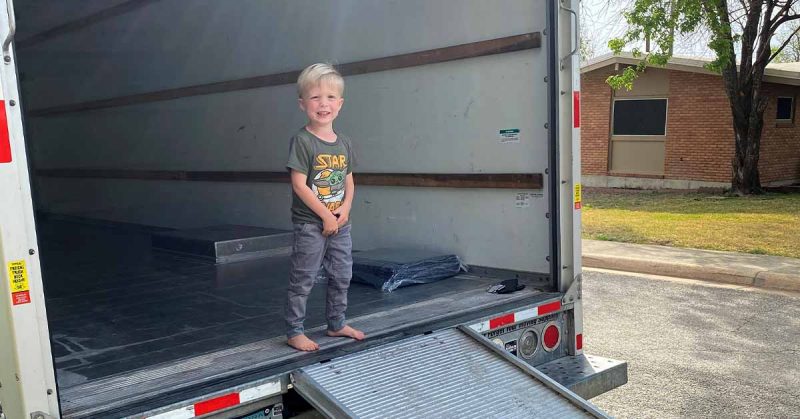We just moved for the third time in the five years of my husband’s Army career. While we are still in the process of acclimating to our new home in North Carolina, I thought I’d share some of the things that have made this process easier for us so far, and some things you can do in advance to help yourself get settled at a new duty station, too.
- Get virtually acclimated before you arrive. If you’re like me, you’ll be overwhelmed when you arrive at your new place, trying to navigate the area, plugging into the community and completing all the necessary tasks that come with moving. On top of that — while it can be exciting — moving can also be somewhat of a grieving experience, and all the tasks you find yourself faced with can seem extraordinarily daunting when your spirits are down. Before you move, do as much research as you can on your new town. Look at maps and find the stores, grocery stores and restaurants you and your family like. Begin researching preschools or childcare (if applicable), doctors, dentists, and hairstylists in the area. You can use MilitaryINSTALLATIONS to get at least some sort of idea of where to start with all of that. Another thing we did that helped lighten our burden was changing our addresses on everything and forwarding our mailing address prior to moving. We also called TRICARE to request that new providers in the area be assigned to our children and me. These were two big to-do’s we easily crossed off before arriving at our new home.
- Bring familiar things with you. I don’t mean tangible things. I mean Friday night pizza night or Taco Tuesday, playing board games before bed, cinnamon rolls on Sunday mornings, turning on the same morning television shows, sitting down for family meals, continuing to go about your normal routines as you are able, and maintaining the traditions and experiences you and your family are used to. This will be good for you, and for your children who crave consistency and predictability. Moving can so easily feel like someone sucked you up in a baster bulb and spat you back out, leaving you disoriented and scattered all over the place. If you bring familiarity with you to your new home, it will be easier to put everything together again, and to hold everyone together within its walls.
- Unpack and decorate fast and furiously. We did a full DITY move this past move, and attempted the “full unpack” style, emptying our boxes out onto the floors and counters and taking all the cardboard and packing paper out of our house — then finding ourselves standing in piles of chaos in every room that we had no choice but to clean up and organize as quickly as possible. I always find that the longer you leave things hiding neatly in boxes, the more likely it is they’ll remain in those boxes. By emptying all the contents onto the floor, you’re forced to find a home for each item.
- Take the initiative with people. Don’t dilly dally when it comes to meeting people and making friends. You not only want to find people who you can lean on when necessary but also people you can call up when you’re in need of some adult conversation. If you meet someone you connect with, don’t hesitate to ask for her number and if she’d like to get together sometime for coffee or for a playdate (if you both have children). Jump right into being there for the other military spouses in your community. Look for ways to help other spouses and lift their burdens, and I’m sure you’ll find they reciprocate. If you meet other moms with young children, offer to babysit on occasion for doctor or dentist appointments. They’ll probably offer the same in return. To make a friend, you must be a friend.
- Start church shopping right away. Our family has always found both the best community and support through the churches we’ve joined at each duty station. Those are the people who brought us meals when we had babies, who offered to mow our lawn when my husband was deployed, the ones who were truly there during hard times. If you do go to church, I suggest starting the shopping process early on. It is an easy thing to keep putting off — but by doing so — you’re also putting off finding that community who you might really count on someday. The military community can be a wonderful thing also, but we have not found it as reliable and consistent as the support and love our church families have provided us.
- Make exploration a priority in the beginning. Force yourself to get out and explore! This can be a fun thing to do in the first few weeks before your soldier reports for duty. Try new restaurants, and explore new parks and places nearby. Try to get established as a family before the monotonous routine of the workweeks begin. My husband left for Airborne School just a couple of weeks after we arrived at Fort Bragg. I’ve tried to get out with the kids at least once a day and try something new, whether it be a playground or store, or the little farm stand and creamery near our house, the library, or just a walk around the neighborhood.
- Ask lots of questions. If you know anyone who is or was stationed at the place you’re going or has been stationed at your new duty station, don’t be afraid to ask questions! I like to ask people for lists of their favorite places, as well as for recommendations for things like doctors, dentists, hairstylists, grocery stores, favorite playgrounds, libraries, breweries, and even babysitter and pet sitter recommendations. We were lucky to have some good friends who previously lived in the Fort Bragg area, and they were able to recommend a lot of things to us as good starting places for new family adventures.
If you are also in the process of acclimating to a new duty station, I hope some of these ideas and suggestions work well for you. Moving is never an easy thing for a family, but there are certainly ways you can ease the burden and make for a smoother transition into your new life.





